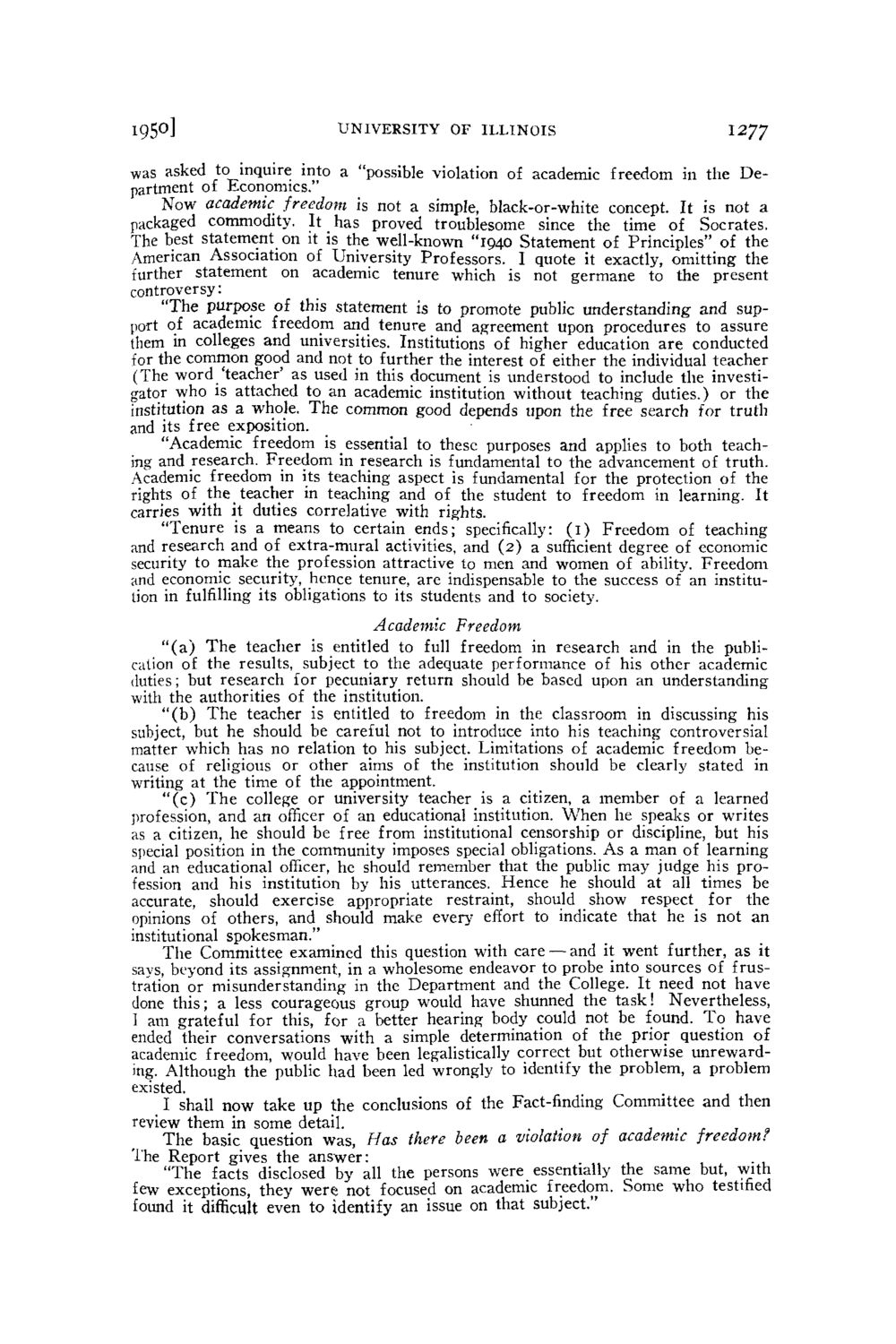| |
| |
Caption: Board of Trustees Minutes - 1950
This is a reduced-resolution page image for fast online browsing.

EXTRACTED TEXT FROM PAGE:
i95o] UNIVERSITY OF I L L I N O I S 1277 was asked to inquire into a "possible violation of academic freedom in the Department of Economics." Now academic freedom is not a simple, b!ack-or-white concept. It is not a packaged commodity. It has proved troublesome since the time of Socrates. The best statement on it is the well-known "1940 Statement of Principles" of the American Association of University Professors. I quote it exactly, omitting the further statement on academic tenure which is not germane to the present controversy: "The purpose of this statement is to promote public understanding and support of academic freedom and tenure and agreement upon procedures to assure them in colleges and universities. Institutions of higher education are conducted for the common good and not to further the interest of either the individual teacher (The word 'teacher' as used in this document is understood to include the investigator who is attached to an academic institution without teaching duties.) or the institution as a whole. The common good depends upon the free search for truth and its free exposition. "Academic freedom is _ essential to these purposes and applies to both teaching and research. Freedom in research is fundamental to the advancement of truth. Academic freedom in its teaching aspect is fundamental for the protection of the rights of the teacher in teaching and of the student to freedom in learning. It carries with it duties correlative with rights. "Tenure is a means to certain ends; specifically: (1) Freedom of teaching and research and of extra-mural activities, and (2) a sufficient degree of economic security to make the profession attractive to men and women of ability. Freedom and economic security, hence tenure, are indispensable to the success of an institution in fulfilling its obligations to its students and to society. Academic Freedom " ( a ) The teacher is entitled to full freedom in research and in the publication of the results, subject to the adequate performance of his other academic duties; but research for pecuniary return should be based upon an understanding with the authorities of the institution. " ( b ) The teacher is entitled to freedom in the classroom in discussing his subject, but he should be careful not to introduce into his teaching controversial matter which has no relation to his subject. Limitations of academic freedom because of religious or other aims of the institution should be clearly stated in writing at the time of the appointment. " ( c ) The college or university teacher is a citizen, a member of a learned profession, and an officer of an educational institution. When he speaks or writes as a citizen, he should be free from institutional censorship or discipline, but his special position in the community imposes special obligations. As a man of learning and an educational officer, he should remember that the public may judge his profession and his institution by his utterances. Hence he should at all times be accurate, should exercise appropriate restraint, should show respect for the opinions of others, and should make every effort to indicate that he is not an institutional spokesman." The Committee examined this question with care — and it went further, as it says, beyond its assignment, in a wholesome endeavor to probe into sources of frustration or misunderstanding in the Department and the College. It need not have done this; a less courageous group would have shunned the task! Nevertheless, 1 am grateful for this, for a better hearing body could not be found. T o have ended their conversations with a simple determination of the prior question of academic freedom, would have been legalistically correct but otherwise unrewarding, Although the public had been led wrongly to identify the problem, a problem existed. I shall now take up the conclusions of the Fact-finding Committee and then review them in some detail. . The basic question was, Has there been a violation of academic freedom? The Report gives the answer: "The facts disclosed by all the persons were essentially the same but, with few exceptions, they were not focused on academic freedom. Some who testified found it difficult even to identify an issue on that subject."
| |